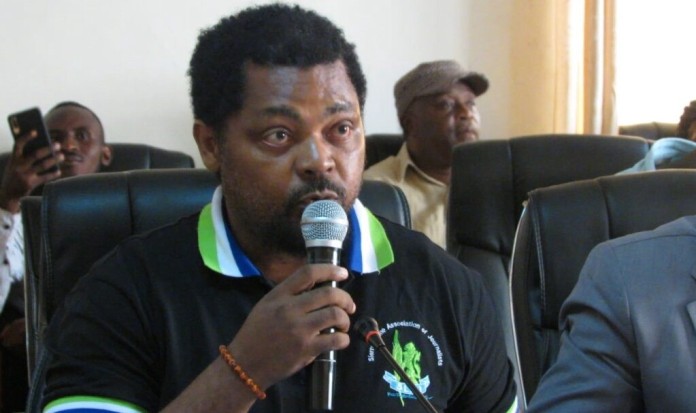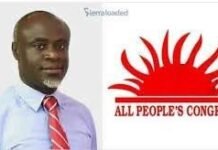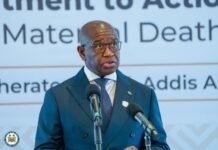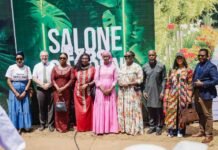By Amin Kef (Ranger)
The Sierra Leone Association of Journalists (SLAJ) on the 3rd May, 2023 joined the rest of the world to commemorate World Press Freedom Day 2023.
President of SLAJ, Ahmed Sahid Nasralla, dilated on the successes, challenges, and future of Press freedom in respective countries, maintaining how in Sierra Leone, the environment is relatively free, safe, and conducive to being a journalist furthering that there is no journalist that is in detention or in prison for doing his or her work.
The SLAJ President went on to state that to assess the level or degree of Press Freedom in the country, it is but fitting to look at it contextually underscoring how the biggest achievement in terms of legislation in the last three years was the historic repeal of the Criminal and Seditious Libel Law in 2020.
He justified that assertion by pointing out that since the repeal there has been a drastic decrease in arbitrary arrests and detention of journalists by the Sierra Leone Police (SLP) for publications that are critical of the Government or high-placed public officials or politicians.
Arguably, he stated that because of the repeal also, Sierra Leone scored progressively in the World Press Freedom Index of 2021 and 2022 moving about 29 places up the world rankings.
He, however, lamented that Sierra Leone dropped 28 places down from 46 in 2022 to 74 in the 2023 global ranking justifying that the drop may have to do with the enactment in the following year of the Cyber Security and Crime Act 2021, which many people, including journalists, perceived as taking back most of the freedom gained through the repeal of the criminal libel law.
“This year’s ranking shows a drop in almost all the indicators including security, legislative, and economic,” he further bemoaned.
He maintained that though SLAJ contributed to the passing of the cyber law by submitting a position paper that supported the legislation to promote responsible use of cyberspace and guard against serious virtual crimes like money laundering, illicit financing, terrorism, cyber bullying, etc, however, the Association raised concerns that certain sections in the Act, especially Section 44, have the potential to undermine press freedom and the freedom of expression of ordinary citizens.
Ahmed Sahid Nasralla maintained that since the passing of the Act, there have been several arrests and detentions of citizens and journalists under the law but none of those cases was actually tested by a trial that was concluded adding that SLAJ continues to raise those concerns as the country approaches the June 24 elections.
He revealed that there is also the Civil Defamation Act of 1961 which can be used by aggrieved persons or entities to seek redress in a court of law if they don’t want to complain to the IMC.
“We have raised the concern that the law is not only archaic but also gives a Judge in a civil libel suit immense discretionary powers to determine the fine if a journalist or a media house is guilty of libel,” he pointed out.
According to him, the media in Sierra Leone is largely independent but mostly polarized along the two main political parties- the ruling Sierra Leone People’s Party (SLPP) and the main opposition party All People’s Congress (APC) stating how Politicians are by law not allowed to own media houses but they bankroll many of the media houses and are the actual beneficial owners attributing such mainly to the poverty of the media.
He said majority of the media in Sierra Leone are owned by journalists themselves and they are mostly one-man businesses even though they are registered as companies limited by guarantee with the Corporate Affairs Commission.
Naming the lack of financial resources and inadequate management systems, he said, such make it difficult, if not impossible, for sustaining or growing media businesses and thus become vulnerable to politicians and big businesses that have the resources.
In his estimation, there is a worrying trend with many journalists openly identifying with political parties and their top candidates in the hope that when these parties assume power they will be compensated with lucrative appointments.
He said such a trend is undermining independent and public interest journalism which a struggling country like Sierra Leone is in dire need of adding that while SLAJ does not condemn any journalist for supporting a political party, because they have the right to do so, SLAJ will continue to encourage media practitioners to do so with responsibility and professionalism, and to be aware of the great personal risk that comes with that.
He argued that the economic situation of the media is becoming unbearable day by day as prices of raw materials used by the print media especially continue to spike unchecked, and advertising which is the life-blood of the media is hard to come these days as the small private sector continues to shrink.
Nasralla said Media houses are literally struggling to survive maintaining that some have downsized operations and laid off some staff.
He said if not for the sustained advert support from Mercury International, Africell and Orange, and some banks- especially Rokel Commercial Bank and Sierra Leone Commercial Bank- most of the media houses would have closed down.
The SLAJ President said ironically, the Government has always been the biggest advertiser and at the same time the biggest debtor to the media adding that media houses that are pro-government are the ones generally benefitting from Government advertisements.
He touched on the National Media Viability and Investment Conference that was held to promote public interest media and investment in the media in Sierra Leone saying the country Sierra Leone is now a beneficiary of a grant of 100 thousand US dollars from the International Fund for Public Interest Media to set up structures for a local National Fund for Public Interest Media to which the government has pledged to commit counterpart funding.
In the area of the welfare of journalists, salary and conditions of service he said they are still unsatisfactory for most journalists and media workers. He, however, revealed that with the passing of the new IMC Act in 2020 it is now a statutory obligation for media employers to pay their staff above the minimum wage, and their social security contributions. He said SLAJ is continuing to engage with the Sierra Leone Reporters Union to address their welfare concerns.
He said the Social media continues to threaten the existence of legacy media as well as the peace and stability of the country. Nasralla disclosed that assessment studies of the information landscape show that the spread of disinformation, fake news, and hate speech on social media and offline to local communities by word of mouth through influencers and trusted voices is largely responsible for violent incidents in the country in the last two to three years, including the infamous August 10th violent protests that claimed the lives of innocent civilians and police officers.
According to him, in light of the forthcoming public elections, SLAJ has positioned itself to not only play a central role but to also set the agenda for the elections.
He said with support from a number of partners: NDI, NED, Irish Aid, FCDO, EU through IDEA International, UNDP, and the ECSL, SLAJ is doing the following: Training of journalists across the country on conflict and gender-sensitive reporting to ensure journalists help to minimize political tension and promote women politicians during the elections.
He mentioned training of journalists on the Proportional Representation system to enable them sensitize the public and politicians about the new system, combating disinformation, fake news, and hate speech during the elections to ensure citizens have increased access to accurate, credible, and reliable information during the elections, embarking on media literacy to help citizens understand how news is produced in a professional manner and how to consume news in a bid to limit the spread of problematic content and that SLAJ is leading a Committee of 11 Member Organisations – the National Political Debates Committee (NPDC)- to organize the presidential debate for the leading political parties to promote dialogue among candidates and issue-based conversations around the elections.
He revealed that in commemoration of World Press Freedom Day 2023 SLAJ and the MRCG, with the support of the EU, will launch the Media Manifesto 2023 with the theme: ‘The MEDIA WE WANT’ on the 26th of May 2023 saying the leaders of political parties contesting the June 24 elections are expected to commit to the media manifesto as part of their parties’ manifestos.
The President of SLAJ used the opportunity to remember all journalists who have lost their lives and those who are in incarceration in trying to bring information to the public.





“He said the Social media continues to threaten the existence of legacy media as well as the peace and stability of the country. Nasralla disclosed that assessment studies of the information landscape show that the spread of disinformation, fake news, and hate speech on social media and offline to local communities by word of mouth through influencers and trusted voices is largely responsible for violent incidents in the country in the last two to three years, including the infamous August 10th violent protests that claimed the lives of innocent civilians and police officers.”- The Calabash
This is where the legal print and electronic media can make it mark if they want to and if they want to gain people’s trust.
For example, when critical topic or issues are maliciously or wrongly spread through social media, Credible and Legal media houses can do the needy by pointing it out as fake and malicious. This is what Reuters for example do under its FACT CHECK column. But if Legal media houses decide to not fact check and report promptly on issues that would cause violent or security issues because of their support for one political party or individual, then they are as well complicit in the problem. The 10 August 2022 incident for example was serially reported on for days by some Media houses including two prominent British American based online newspapers owned by two Sierra Leone. These two papers even predicted what was going to happen, how police should be treated if they dare stop the rioters and indeed as the reported, so it came to pass. Ironically, no newspaper in Sierra Leone including the Journalistic body SLAJ did not come out to forestall such bad media practice or educate people about their obligation and responsibilities.
If people know that they can fact check social media posts in newspapers, they will rush to such newspaper every time there is a social media post that is sent out to cause panic, problems or defame people be they in or out of government.